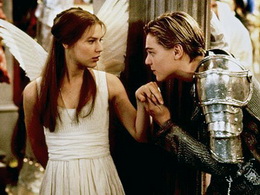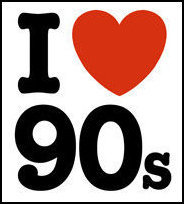Don't forget to entire the Children of the 90s Ultimate Nostalgia-Fest 2010 Giveaway! It's open until Wednesday, February 17. Click here to see rules and enter for your chance to win some fun Goosebumps, BSC, Magic Eye, Lisa Frank, Pete and Pete, and more!

Why don't we offer the Physical Challenge as a viable alternative to difficult tasks anymore? It always worked for our pals on Double Dare. Just picture it. You're in a crowded classroom taking your bar exam and you come across an exceptionally confounding question. Imagine how much simpler things would be if you could simply alert the proctor you were going to take the Physical Challenge instead. You'd get up from your desk, put on the giant clown pants, and proceed to catch flying pies catapulting toward you at breakneck speed. "Pie in the Pants" was a credible recourse for baffled minds on 90s kids game shows; why not extend it to other arenas? At the very least, it would give some much needed excitement and spontaneity to those boring hours-long tests.
In actuality, not much of the Double Dare world translates into real life. It's a testament to the show's creators' creativity--or insanity, depending on your sense of whimsy and wonder. It was like some sort of alternate kid fantasy universe: children slimed their parents, slid down a giant Sundae Slide, and went home with armloads of cash and prizes. It was crazy and nonsensical and criminally messy, but it was undeniably pure kid-driven fun.
It's another one of those Nickelodeons 80s and 90s anomalies where you'd just got to wonder what was running through the network executives' respective heads when the Double Dare creators pitched them the show. "We open with a messy challenge, see. Then we move onto a random, disjointed trivia round that's actually an excuse to stump kids and have them opt for an even messier challenge. Next, the team with the most points attempts an utterly insane obstacle course, searching for flags in piles of sloppy food, swimming through vats of jello, running on a giant hamster wheel, and monkey barring their way over to the spewing Gak Geiser. If they make it, they go to space camp and get to thow up on one of those anti-gravity simulation spinny rides. How does that sound?" To which we can only imagine the Nickelodeon bigwigs replied, "Excellent! We'll take 500 episodes."
The show went through a series of reformatted and re-imagined incarnations, but the underlying structure remained the same. First up, we had Super Sloppy Double Dare:
It seems the major differentiating feature of Super Sloppy Double Dare was that it was not just regular sloppy but indeed super sloppy. The original version of Double Dare was messy, but SSDD brought disgusting sloppiness to a whole new level. The challenges existed for the sole purpose of creating the most explosive mess imaginable. This version had more thematic episodes and gimmicks, but the main change was probably in the significant increase in the number of janitors employed by the show.
There was the quickly-dropped Celebrity Double Dare concept:
This version never actually made it into production, so all we have to remember it by is this pilot footage. It was mostly like Double Dare, but everything was just a tiny bit off, meaning fans would probably never accept it. It was hosted by a feathered-haired Bruce Jenner, who depending on your generation is either that dashing Wheaties box-gracing Olympian or the frozen-faced dad on Keeping Up With the Kardashians.
Next up we had the popular Family Double Dare:
This clip hails from the Nickelodeon (not FOX) era. Just in case you were curious.
For this version, the show had a brief stint on the Fox network in a Saturday night timeslot. As the name implies, this version pitted two families against one another in lieu of all-kid teams. Teams included two parents and two children. Families cycled through the same segments as in the original Double Dare (Opening Stunt, Physical Challenges, Triva, Obstacle Course) but it was a new plane of funny to watch adults wade through knee-deep slime ravines. The show moved back to Nickelodeon in 1990, where it continued to humiliate parents everywhere through the cunning use of pies.
We also had Super Special Double Dare, which was basically a pared down retooling of Celebrity Double Dare. We had sports stars, Nick stars, and minor celebrities competing for charity. I don't know if it necessarily lived up to its promise of being Super Special, but it was at the very least averagely special.
Unfortunately, the Double Dare book didn't close then. There was actually a Double Dare 2000 version, or as 90s children may better know it, The Version That Shall Not Be Named. Heresy, I tell you. Um, hi, they called the Obstacle Course the Slopstacle Course. Really? Really? They should be ashamed of themselves. Where's my beloved host Marc Summers? What? Relegated to an executive consultant credit? For shame.
Can you believe this was already ten years ago? Depressing, no?
Speaking of Marc Summers, Double Dare and his ever-expanding portfolio of other Nickelodeon hosting duties turned him into the poster child for irony. Unbeknownst to the world (and to Marc, until he was diagnosed at age 43), Summers suffered from obsessive compulsive disorders. Yes, that's right. The man who brought us our daily dose of super sloppiness later went on to co-author the book, "Everything in its Place: My Trials and Triumphs with Obsessive Compulsive Disorder."
Double Dare lived on in syndicated reruns for many years following its 1992 cancellation. As Summers remarks in his book, "We had enough episodes on tape to do reruns forever." Indeed, the pure volume of episodes must speak to the high demand for this type of purely entertaining children's television programming. Yes, the show had a trivia question or two thrown in for good measure, but it was far from educational. It taught us something far more valuable: how to have fun and be kids. Oh, and how to dig a flag out of a Super Sloppy Blue Plate Special. I'm still thinking that one's going to come in handy someday.






